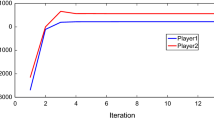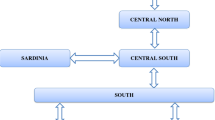Abstract
We consider an n-player non-cooperative game with random payoffs and continuous strategy set for each player. The random payoffs of each player are defined using a finite dimensional random vector. We formulate this problem as a chance-constrained game by defining the payoff function of each player using a chance constraint. We first consider the case where the continuous strategy set of each player does not depend on the strategies of other players. If a random vector defining the payoffs of each player follows a multivariate elliptically symmetric distribution, we show that there exists a Nash equilibrium. We characterize the set of Nash equilibria using the solution set of a variational inequality (VI) problem. Next, we consider the case where the continuous strategy set of each player is defined by a shared constraint set. In this case, we show that there exists a generalized Nash equilibrium for elliptically symmetric distributed payoffs. Under certain conditions, we characterize the set of a generalized Nash equilibria using the solution set of a VI problem. As an application, the random payoff games arising from electricity market are studied under chance-constrained game framework.
Similar content being viewed by others
References
Adler, I.: The equivalence of linear programs and zero-sum games. Int. J. Game Theory 42(1), 165–177 (2013)
Basar, T., Olsder, G.J.: Dynamic Noncooperative Game Theory, 2nd edn. SIAM, Philadelphia, PA (1999)
Blau, R.A.: Random-payoff two person zero-sum games. Oper. Res. 22(6), 1243–1251 (1974)
Cassidy, R.G., Field, C.A., Kirby, M.J.L.: Solution of a satisficing model for random payoff games. Manag. Sci. 19(3), 266–271 (1972)
Charnes, A., Cooper, W.W.: Deterministic equivalents for optimizing and satisficing under chance constraints. Oper. Res. 11(1), 18–39 (1963)
Charnes, A., Kirby, M.J.L., Raike, W.M.: Zero–zero chance-constrained games. Theory Probab. Appl. 13(4), 628–646 (1968)
Cheng, J., Leung, J., Lisser, A.: Random-payoff two-person zero-sum game with joint chance constraints. Eur. J. Oper. Res. 251(1), 213–219 (2016)
Conejo, A.J., Nogales, F.J., Arroyo, J.M., García-Bertrand, R.: Risk-constrained self-scheduling of a thermal power producer. IEEE Trans. Power Syst. 19(3), 1569–1574 (2004)
Couchman, P., Kouvaritakis, B., Cannon, M., Prashad, F.: Gaming strategy for electric power with random demand. IEEE Trans. Power Syst. 20(3), 1283–1292 (2005)
Dantzig, G.B.: A proof of the equivalence of the programming problem and the game problem. In: Koopmans, T. (ed.) Activity Analysis of Production and Allocation, pp. 330–335. Wiley, New York (1951)
Facchinei, F., Fischer, A., Piccialli, V.: On generalized Nash games and variational inequalities. Oper. Res. Lett. 35, 159–164 (2007)
Facchinei, F., Pang, J.S.: Finite-Dimensional Variational Inequalities and Complementarity Problems. Springer, New York (2003)
Fang, K.T., Kotz, S., Ng, K.W.: Symmetric Multivariate and Related Distributions. Chapman and Hall, London (1990)
Faraci, F., Raciti, F.: On generalized Nash equilibrium in infinite dimension: the Lagrange multipliers approach. Optimization 64(2), 321–338 (2015)
Henrion, R.: Structural properties of linear probabilistic constraints. Optimization 56(4), 425–440 (2007)
Jadamba, B., Raciti, F.: Variational inequality approach to stochastic Nash equilibrium problems with an application to Cournot oligopoly. J. Optim. Theory Appl. 165(3), 1050–1070 (2015)
Jiang, H., Shanbhag, U.V., Meyn, S.P.: Distributed computation of equilibria in misspecified convex stochastic Nash games. IEEE Trans. Autom. Control 63(2), 360–371 (2018)
Kakutani, S.: A generalization of Brouwer’s fixed point theorem. Duke Math. J. 8(3), 457–459 (1941)
Kannan, A., Shanbhag, U.V., Kim, H.M.: Addressing supply-side risk in uncertain power markets: stochastic Nash models, scalable algorithms and error analysis. Optim. Methods Softw. 28(5), 1095–1138 (2013)
Koshal, J., Nedić, A., Shanbhag, U.V.: Regularized iterative stochastic approximation methods for stochastic variational inequality problems. IEEE Trans. Autom. Control 58(3), 594–609 (2013)
Kulkarni, A.A.: Generalized Nash games with shared constraints: existence, efficiency, refinement and equilibrium constraints. Ph.D. thesis, University of Illinois at Urbana-Champaign. https://www.ideals.illinois.edu/handle/2142/18469 (2011)
Kulkarni, A.A., Shanbhag, U.V.: On the variational equilibrium as a refinement of the generalized Nash equilibrium. Automatica 48(1), 45–55 (2012)
Lemke, C., Howson, J.: Equilibrium points of bimatrix games. SIAM J. 12, 413–423 (1964)
Mazadi, M., Rosehart, W.D., Zareipour, H., Malik, O.P., Oloomi, M.: Impact of wind integration on electricity markets: a chance-constrained Nash Cournot model. Int. Trans. Electr. Energy Syst. 23(1), 83–96 (2013)
Nash, J.F.: Equilibrium points in n-person games. Proc. Natl. Acad. Sci. 36(1), 48–49 (1950)
von Neumann, J.: On the theory of games. Math. Annalen 100, 295–320 (1928)
Prékopa, A.: Stochastic Programming. Springer, Dordrecht (1995)
Ravat, U., Shanbhag, U.V.: On the characterization of solution sets of smooth and nonsmooth convex stochastic Nash games. SIAM J. Optim. 21(3), 1168–1199 (2011)
Rosen, J.B.: Existence and uniqueness of equilibrium points for concave N-person games. Econometrica 33(3), 520–534 (1965)
Singh, V.V., Jouini, O., Lisser, A.: Equivalent nonlinear complementarity problem for chance-constrained games. Electron. Notes Discrete Math. 55, 151–154 (2016)
Singh, V.V., Jouini, O., Lisser, A.: Existence of Nash equilibrium for chance-constrained games. Oper. Res. Lett. 44(5), 640–644 (2016)
Singh, V.V., Jouini, O., Lisser, A.: Distributionally robust chance-constrained games: existence and characterization of Nash equilibrium. Optim. Lett. 11(7), 1385–1405 (2017)
Xu, H., Zhang, D.: Stochastic Nash equilibrium problems: sample average approximation and applications. Comput. Optim. Appl. 55(3), 597–645 (2013)
Yousefian, F., Nedić, A., Shanbhag, U.V.: Self-tuned stochastic approximation schemes for non-Lipschitzian stochastic multi-user optimization and Nash games. IEEE Trans. Autom. Control 61(7), 1753–1766 (2016)
Author information
Authors and Affiliations
Corresponding author
Rights and permissions
About this article
Cite this article
Singh, V.V., Lisser, A. Variational inequality formulation for the games with random payoffs. J Glob Optim 72, 743–760 (2018). https://doi.org/10.1007/s10898-018-0664-8
Received:
Accepted:
Published:
Issue Date:
DOI: https://doi.org/10.1007/s10898-018-0664-8
Keywords
- Chance-constrained games
- Variational Inequality
- Elliptically symmetric distribution
- Generalized Nash equilibrium
- Cournot competition




